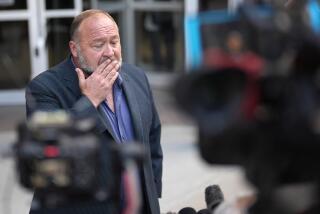Investors Ask Judge for Priority If Government Recoups Keating Assets : Banking: She replies she fears U.S. will use any seized funds to pay for its own costs in the Lincoln Savings & Loan collapse.
- Share via
LOS ANGELES — Small investors who were devastated when Lincoln Savings & Loan collapsed urged a federal judge Monday to take care of them first if the government recoups any funds that might have been hidden by former Lincoln operator Charles H. Keating Jr.
U.S. District Judge Mariana R. Pfaelzer was sympathetic.
Repeating concerns that she expressed last July in ordering Keating to forfeit $265 million, Pfaelzer said she fears the government will use seized assets to pay its own costs in the Keating case instead of reimbursing investors.
Investors initially lost $285 million after Keating’s real estate and financial empire collapsed in April, 1989. Many were elderly depositors who had invested their life savings in risky bonds that were sold at the Irvine thrift’s Southern California branches.
“I would rather see the victims get the money,” she said.
She told Kevin P. Roddy, a bondholders’ lawyer, that she will consider their petition. She didn’t set a date for another hearing, but said it would be soon, perhaps next week.
Keating, serving a prison term for his convictions on conspiracy, fraud and racketeering charges, contends he is broke.
Bondholders and the government believe he may have hidden assets abroad during the months before the failure of Lincoln and its parent company, American Continental Corp. in Phoenix.
Particularly suspect are huge losses that American Continental reported in international currency trading. Millions of dollars were shipped to Europe to cover those losses at a time when nearly all the corporation’s revenue came from sales of the risky American Continental bonds.
The bondholders, who lost more than $168 million, have recovered about half of their principal by suing lawyers, accountants and others who helped prop up Keating’s empire.
Roddy complained that the government has refused to allow bondholders’ attorneys and investigators to help search for Keating loot. The FBI and regulators received extensive help at no charge from the bondholders’ team while the government investigated Keating, he said.
Tomson T. Ong, an assistant U.S. attorney assigned to the Keating assets search, told Pfaelzer that the government welcomes help but not meddling.
“They want to direct the way we want to litigate the case,” he said of the bondholders’ lawyers.
Ong said that since the bondholders have no secured interest in any property that could be seized, their avenue to recoup losses under federal law is to petition the U.S. attorney general directly.
He suggested that such an appeal would succeed.
“My marching instructions were . . . that a portion of the assets will go to the bondholders,” Ong said.
Replied Pfaelzer: “It will disturb me greatly if I begin to think the bondholders will get only a small portion.”
At a hearing scheduled for Monday, the government will ask the judge to approve using Keating assets it has identified so far to help satisfy the forfeiture order.
Those assets include six residential lots in Canada and one lot in Phoenix; promissory notes from Keating’s son, five daughters and their spouses; other IOUs from associates and the holding company for the lavish Phoenician Resort that Keating built in Arizona; and some brokerage accounts.
Also listed were two vehicles--a 1970 Lincoln sedan and a 1990 Chevrolet pickup. Absent from the list were the Mercedes-Benzes that Keating favored during his years in Arizona as American Continental’s chairman.
More to Read
Inside the business of entertainment
The Wide Shot brings you news, analysis and insights on everything from streaming wars to production — and what it all means for the future.
You may occasionally receive promotional content from the Los Angeles Times.










